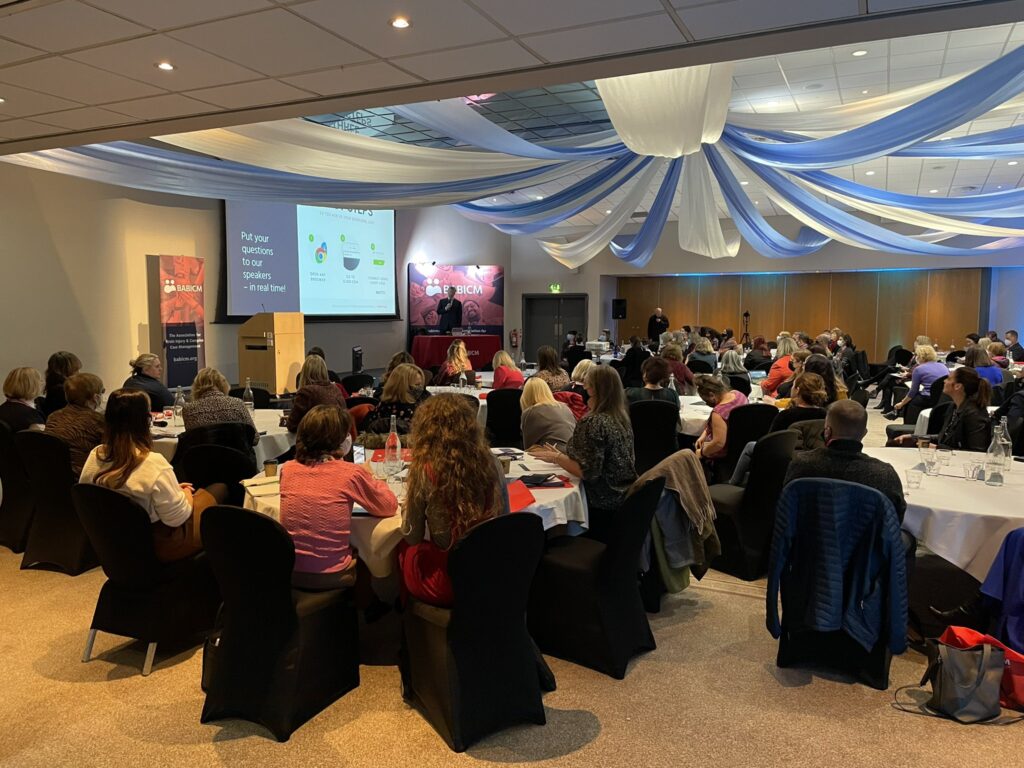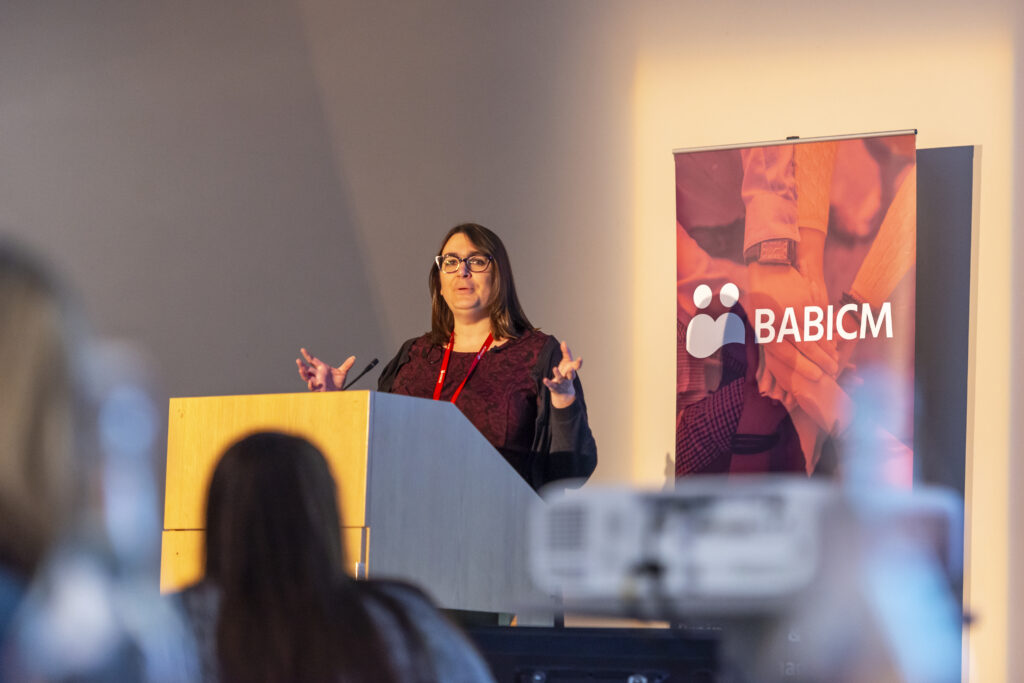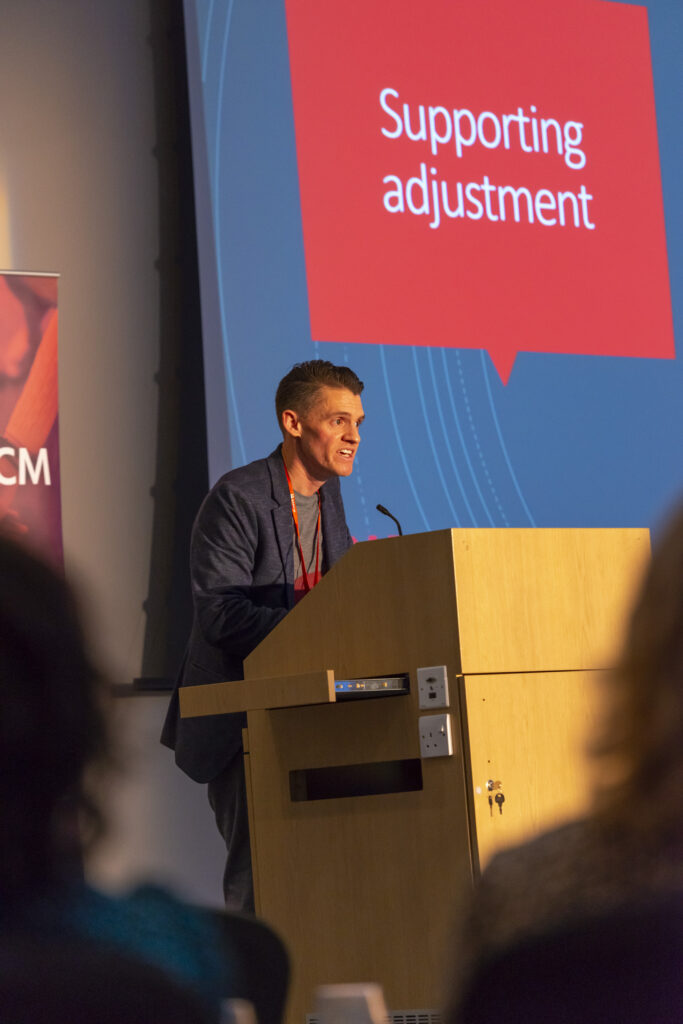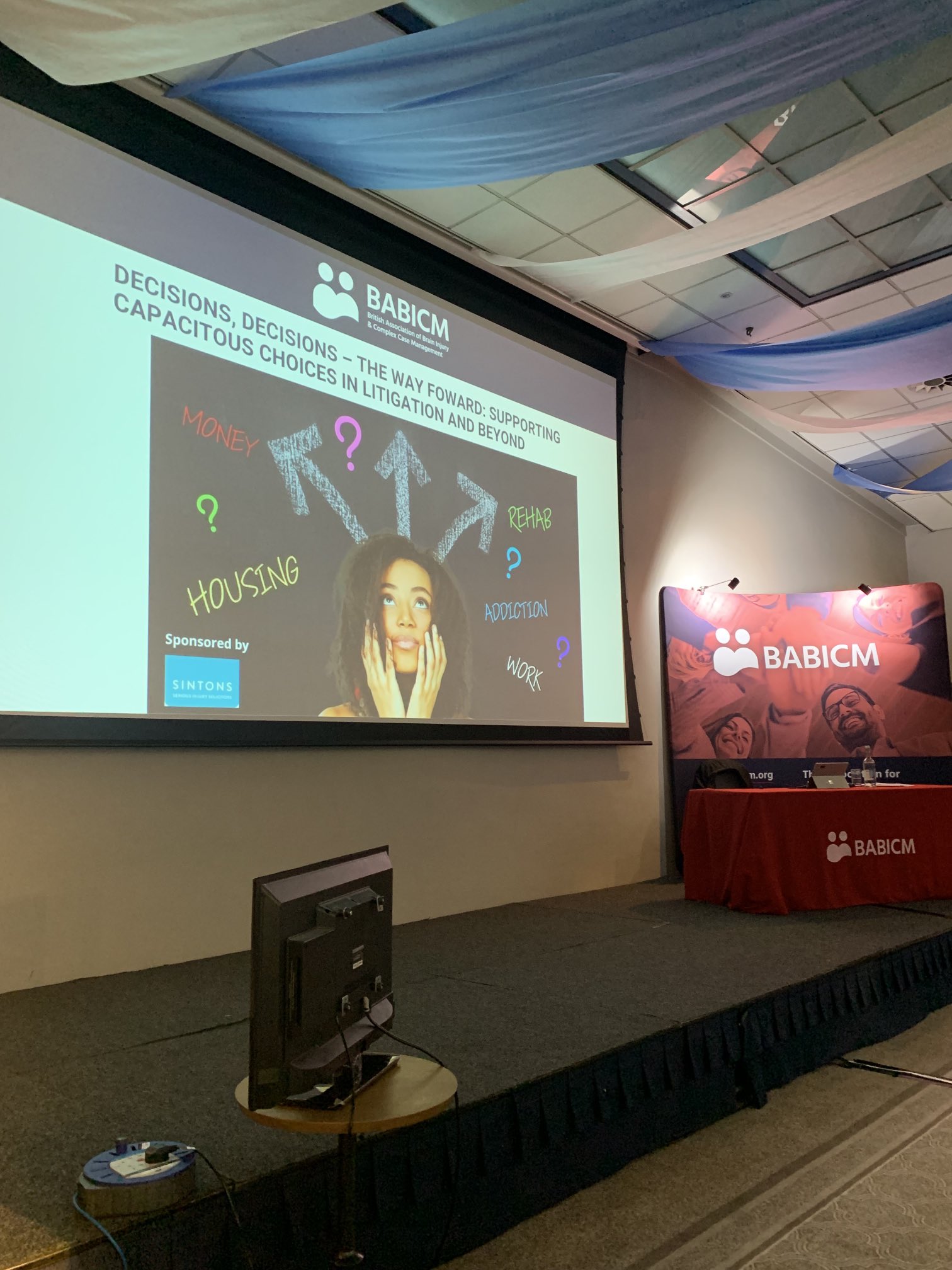
The BABICM Training Events Group organised a thought-provoking and educational conference this month, chaired by Andrew McGowan, Head of Neurotrauma at Sintons, about decision-making and capacity.
BABICM Training Events Group members Joanne Foster, Jackie Waggott and Sally Wilkinson were all involved in coordinating the conference. Joanne said: “Case managers need to understand the regulations and laws that underpin our practice. There are many issues around capacity and it’s important that we have a thorough and up to date knowledge base”. Jackie reiterated her words and said: “Fluctuating capacity can be especially problematic, but we know our clients and that’s crucial in assessments”. Sally commented: “The conference highlighted the need for case managers, our roles, and the importance of having the required skills and knowledge in situations where capacity is a concern”.
The event began with an overview of the Mental Capacity Act (MCA). Eilish Ferry-Kennington, Associate Solicitor, Court of Protection Team at EMG Solicitors discussed the key principles (see Table 1) and said: “If you are making decisions for people you need to get them right. Everyone should be assumed to have capacity until they’re assessed, and the decision has to be the least restrictive option.”
Table 1: Principles of the Mental Capacity Act 2005

Capacity is specific to the decision being made at a point in time. The person with the brain injury needs to understand and retain the relevant information and be able to consider and communicate the information. The assessor should have experience in brain injury and conduct the assessment in a suitable environment to help engagement with the person. The case manager should provide as much information as possible to the assessor and be balanced when supporting their client.
 Eilish Ferry-Kennington discussed clients with fluctuating capacity
Eilish Ferry-Kennington discussed clients with fluctuating capacity
“Managing fluctuating capacity is difficult and there is a lot of disagreement on how this should be approached” said Eilish. The MCA says only assess at a time that the decision is made. The Deprivation of Liberty Safeguards: Code of Practice says a balance needs to be struck between the review and ending if the person regains capacity. There should be a regular review, but no period is recommended, and the Court of Protection (CoP) often has to deal with fluctuating capacity issues. Managing property, finances, personal affairs, and health all need decisions at specific points in time so capacity must be reviewed constantly. Eilish concluded: “Applying the theory to practice is key but there are gaps in the law which make it difficult for all those involved”.
 Dr David Todd looked at how case managers can support
Dr David Todd looked at how case managers can support
young clients through the transition into adulthood
Dr David Todd, Clinical Neuropsychologist at Reconnect Psychology discussed the decisions required when a young person transitions to adulthood e.g., where to live, finding work, navigating relationships, and how to support them to make the right decision. David said: “The combination of practical and functional challenges during the transition are complex, even more so if the person has a brain injury. There is no ‘cookbook’ to solve these issues.” The case manager’s role is key in supporting and empowering the young client to make decisions in the context of their injury and limited life experience.
 Louise Sheffield reflected upon unwise decisions
Louise Sheffield reflected upon unwise decisions
made by clients and the challenges case managers face
The importance of case managers documenting everything was highlighted in case studies discussed by Louise Sheffield, Clinical Case Manager at Active Case Management. Louise said: “Every client is different. It’s important to understand the client pre-injury because that may explain some of their potential decisions post-injury. Make sure you document everything. Be flexible; you need a good working relationship and ongoing dialogue to understand the evolving situation and support your client.”
 Gerard Martin QC explained challenges related to the litigation process
Gerard Martin QC explained challenges related to the litigation process
for legal teams representing clients who have capacity to litigate
“Case managers are not expected to be lawyers but it’s helpful that they know about the law as it impacts on their role” said Gerard Martin, Queen’s Counsel, Exchange Chambers who regards case managers as ‘witnesses of gold’. Case managers are not ‘expert’ witnesses but witnesses of fact. Gerard said: “Case managers can give evidence of impression; the Civil Evidence Act 1972 allows that to happen”. The information provided by the case manager about the client is hugely important especially if a decision is challenged. Gerard explored the responsibility of the team in balancing protection as well as client choice, with decisions on a variety of issues that can sometimes end up in the CoP. He discussed lifestyle issues that can be problematic such as alcohol, drugs, partner choice, place of residence, pets, and sex. Gerard’s advice about sex was: “Steer well clear of helping of families and clients to have a relationship with sex worker – anyone who tries to help is liable to prosecution”.
 Mobien Hussain explored the challenges of supporting clients with
Mobien Hussain explored the challenges of supporting clients with
capacity who wish to manage their own directly employed care team
Some clients directly employ their care team. This can be problematic especially if the client has no experience of employing people or understanding of the employer responsibilities. Mobien Hussain, Senior Associate Solicitor, Court of Protection Team at Irwin Mitchell Manchester discussed the challenges and advised case managers how to navigate tricky issues around direct employment. “Case managers are not employers, and the care team needs to be aware who the employer is” said Mobien. She stressed the importance of documenting everything and always consulting with the trustees when there are employment issues. Contracts of employment should always be up to date, correctly identifying the person who is the employer, correct policies and procedures should be in place, advice obtained as appropriate, and everything should be documented.
 David Hilton explained work in practice if the client makes
David Hilton explained work in practice if the client makes
numerous unwise financial decisions
David Hilton, Partner and Head of Court of Protection at CFG Law, in his role as a trustee, stressed the importance of clients making wise financial decisions so monies last as long as possible. He reminded delegates about the ‘Personal Injury Trust’, a legal process that allows any compensation received because of an accident or injury by a person with capacity to be disregarded when the client is assessed for means-tested benefits. David also explained ‘Peters undertaking’ when the settlement includes an agreement not to go back to the State for funds regarding therapy and equipment. However, there are circumstances when you can, and will go back as the State has a duty to provide care. David commented: “Unfortunately there is no crystal ball for these clients as they have life-changing needs. Often the settlements are inadequate for life-long care”. Budgets need to be reviewed regularly and updated annually which involves the trustees, case managers and everyone involved in supporting the client.
Andrew closed the conference saying: “Thank you to BABICM for organising this high calibre event”. He thanked the speakers and exhibitors for their support. Joanne, Jackie, and Sally all emphasised that these events are excellent for networking, discussing current topics and challenges, and sharing best practice. They concluded: “We can’t know everything, but we must know how and where to access information and where to go for support. BABICM as an organisation is there to help you be the best-case manager you can be.”
This event was recorded and will be available for purchase early 2022.

